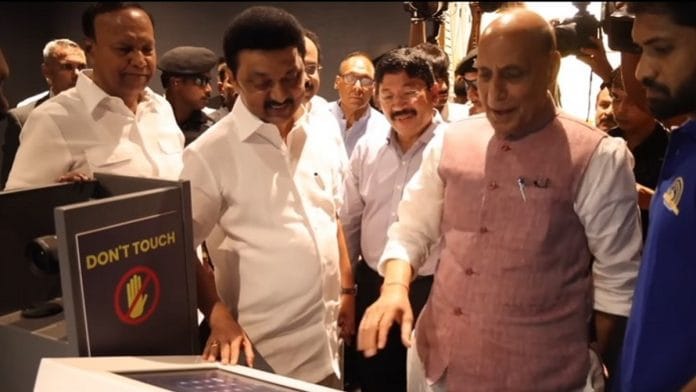To observers of politics in Tamil Nadu over the last two years, the fresh allegations about “secret” ties between the BJP and ruling DMK, have hardly come as a surprise. But so far, there have rarely been public displays of the suspected bonhomie between the two. Both sides have made it a point to issue critical statements of each other, and during the Lok Sabha elections, DMK boss and Chief Minister MK Stalin was one of the main architects of the INDIA alliance against the BJP.
But last Sunday, the leaders of the two parties came together for the release of a Rs 100 commemorative coin, issued by the central government, in honour of former Tamil Nadu Chief Minister and DMK patriarch M Karunanidhi. Defence Minister Rajnath Singh called Karunanidhi a “titan of Indian politics” in the event, which was also attended by Stalin. With this and other recent signs of a thaw, the state has come alive again with speculation of what the future holds for the political formations in Tamil Nadu.
Ideologically, the BJP and DMK are polar opposites, making an alliance like the one they formed in 1999 seem extremely unlikely. If anything, such an alliance would be counterproductive, alienating the core minority vote bank of the DMK as well as the BJP’s caste Hindu support base. Instead, what we seem to have is a tacit understanding aimed at weakening common foes and keeping restive allies in check.
Also Read: 3 years of Stalin as Tamil Nadu CM — ‘governance style more like Jayalalithaa than Karunanidhi’
Benefits of cosying up
Both the DMK and BJP have a common goal—weakening the AIADMK, which until a few years ago was the single largest party in the state. The BJP appears to believe that if it can cause serious damage to the AIADMK, it can emerge as the main rival to the DMK in Tamil Nadu.
For the BJP government in Delhi, keen on keeping NDA alliance leaders like Chandrababu Naidu and Nitish Kumar in check, the DMK presents an attractive backup plan.
As for the DMK and Stalin, the gains of cosying up to the BJP are many. For one, there has been virtually no movement on cases against party leaders, most notably the appeal in the 2G spectrum case. Also, compared to the treatment meted out to Opposition governments and their leaders in Delhi, Bengal, Jharkhand, and now Karnataka, the BJP-led central government has been perceptibly soft on the DMK. Only one minister, V Senthil Balaji, is currently in jail, with his troubles stemming more from court actions than from the Modi government’s efforts.
The DMK likely sees better ties with the BJP as a way to keep its ally, the Congress, from getting over-ambitious in the state. A period free of raids and harassment would also give Stalin the opportunity to formally anoint his son Udhayanidhi as his deputy chief minister and successor. Udhayanidhi Stalin, too, would thus get ample time to stabilise his position in the party and government.
Stamp of approval?
Defence Minister Rajnath Singh’s visit to Chennai for the release of the commemorative coin did not, in itself, raise eyebrows. What did was his visit to Karunanidhi’s memorial along with state BJP leadership, including Union minister L Murugan and state party president K Annamalai. Adding to the surprise was Prime Minister Narendra Modi’s letter, released on the occasion, where he was effusive in his praise for Karunanidhi, Stalin’s father.
Stalin later told mediapersons that he was overcome with emotion when Rajnath Singh asked for a standing ovation to be given at the function and also posted on X about being “deeply grateful”.
Thank you, Hon'ble @rajnathsingh, for releasing the Kalaignar Centenary Commemorative Coin and showering rich praises on Thalaivar Kalaignar.
You have elegantly highlighted his crucial contributions to Federalism, Indian Democracy, and Tamil Nadu's development. Deeply grateful… pic.twitter.com/vMtoQKpxuS
— M.K.Stalin (@mkstalin) August 19, 2024
While both parties scurried to clarify that the event was purely an exercise in political civility, this line found few takers in the state. Even long-time pro-DMK journalists criticised the party’s moves, while online supporters of the BJP expressed their disgust at what they saw as a sellout.
While AIADMK general secretary and former chief minister Edappadi Palaniswamy has alleged a secret understanding between the DMK and BJP, leaders of the Tamil Nadu Congress were appalled that Rahul Gandhi, a staunch supporter of Stalin, was not invited to the coin release function.
Any talk of an alliance between the parties, however, is too premature and extremely unlikely. What is more plausible is a continued understanding to wrong-foot the AIADMK and Congress.
But the recent events have backfired and led to the credibility of both parties taking a hit in Tamil Nadu. Both the BJP and DMK will have a hard time convincing their core supporters that there is no secret understanding to help each other by weakening common enemies and even allies.
If the AIADMK and the Congress are smart enough to seize the opportunity presented to come together again, Tamil Nadu could see a new alliance forming for the 2026 Assembly elections.
The author is a political analyst, doctor, and healthcare IT professional. Views are personal.
(Edited by Asavari Singh)






